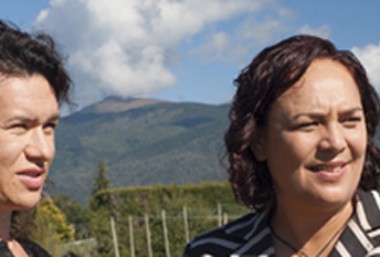Kono's Māori-based values are a unique selling point for one Kiwi food and wine exporter, so protecting its IP is vital.
Kono NZ is a premium food and beverage company that's taking its innovative products and techniques underpinned by traditional Māori values to the global market. With three divisions producing wine, fruit and seafood, it has mussel and oyster farms, vineyards and orchards throughout the Marlborough region, from where it exports to more than 25 countries.
With 300 staff and farming 530 hectares of land and sea, Kono came into being in 2011, when all the food and beverage businesses of Wakatu Incorporation were consolidated under one brand.
'A kono is a traditional woven-flax basket used to serve food' says Wakatu chairman Paul Morgan. 'We're a Māori business so it's essential we have a brand that reflects what's important to us as an organisation and captures our core values'.
Wakatu had previously been using the Kono brand for some of its wine and mussel products. The brand now covers Kono Horticulture, Kono Seafood and Kono Beverages, including the internationally awarded Tohu wine.
'We needed a powerful master brand across our different divisions. Kono is currently the most widely exported Māori brand and we want to grow it, introduce other products and work with other Māori businesses with new food products in the future'.
Intellectual property experts AJ Park have been advising Wakatu for many years and assisted Kono with IP protection after their restructure. Lynell Tuffery Huria advises the organisation on appropriate and cost-effective trade mark protection for Kono in its various markets.
'My role involves identifying the markets they are entering and getting protection there, while reviewing current levels of protection and ensuring they're adequate', she says. 'It's a unique Māori values-based organisation so we need to consider this factor when advising'.
Kono's export strategy is to develop both existing and new customers, as well as introduce new products to those markets. It recently began farming flat oysters and wants to take these to its mussel buyers. Another emerging brand is Aronui wine.
'It hasn't been an easy road to get trade mark protection', says Tuffery Huria. 'That's always a lesson for anyone entering new markets - just because you can use your brand in New Zealand, it doesn't mean you can go ahead and use it overseas'.
The US, Kono's main market, buys Kono wine, mussels and fruit. Europe and Asia are also significant markets, with major customers in Hong Kong, Taiwan and Korea.
'It's vital that our IP is protected in all those countries according to our strategy to develop new customers', says Morgan. 'Doing this is expensive, but we target protection to areas where we have existing trading relationships and where we see potential for future products going forward'.
Anyone dealing in the international marketplace needs to have good IP protection in place. AJ Park has given us great advice. They're experts in their field and we rely on their knowledge.
- Paul Morgan, Wakatu chairman
Paradoxically, it's been protecting Wakatu's brands in New Zealand that's posed the biggest challenge.
'Māori words are more difficult to register here than overseas', says Tuffery Huria. 'The Intellectual Property Office has raised objections based on the literal meanings of certain Māori words. We've had to argue that this isn't relevant because the words have holistic or esoteric meanings that are more relevant'.
'These arguments have helped get the trade marks registered. It's very novel for a Māori-based organisation to use Māori words, imagery and means as part of their branding message, and also to seek IP protection for those elements'.
Kono is also moving into the innovation space, investing in new processes, machinery, environmentally sustainable practices, and products such as flat oysters and hops. The organisation is also doing some research work with Industrial Research Ltd (now Callaghan Innovation).
'The strategy moving forward is ensuring that Kono can capture all that IP as it creates new machinery or products, and looking for opportunities for patent, copyright, and other forms of IP protection so they can gain that competitive advantage through innovation', she says.
'I've worked with Kono for a long time and seen them grow into an organisation that's unique in its size and its market position. Because Kono are different to our traditional clients, we've had to think laterally to come up with solutions for them, but it's been really satisfying'.
Written by Deirdre Coleman, this case study was featured in #45 of Idealog. Photo courtesy of Oliver Webb.
